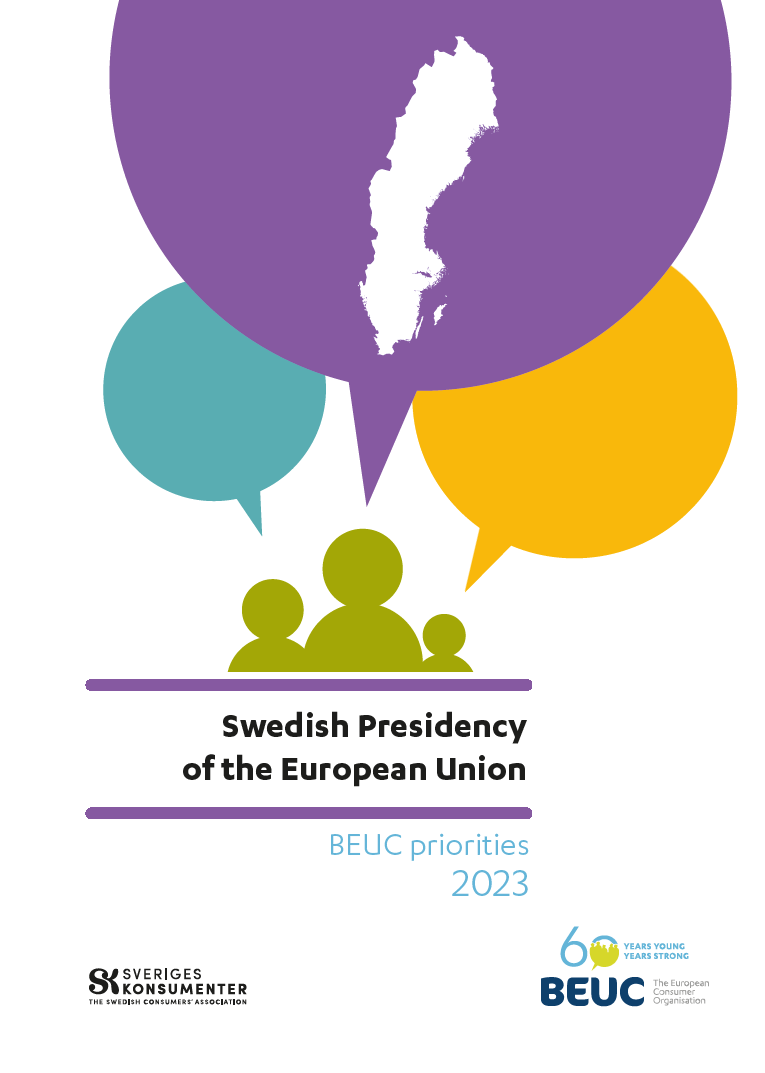Swedish Presidency of the EU: what priorities for consumers?
Swedish Presidency of the EU: what priorities for consumers?
BEUC NEWS - 20.12.2022
On 1 January 2023, Sweden will take over the rotating presidency of the EU Council, succeeding to the Czech Republic. With our Swedish member organisation Sveriges Konsumenter, we encourage the Swedish presidency to strive to deliver clear benefits to European consumers, who are being hit hard by the cost-of-living crisis.
From financial services and digital rights to sustainable living and consumer rights, there will be plenty to work on over the next six months. BEUC highlights from its new memorandum the following key initiatives that affect consumers and for which the Swedish presidency term will be decisive:
-
The ‘Empowering consumers for the green transition’ initiative: The proposal is a step in the right direction but still requires some improvements. We hope the Swedish Presidency will reach an agreement on this proposal.
-
The Ecodesign for Sustainable Products Regulation: The proposal to revise and broaden the scope of the existing Ecodesign Directive needs to make sustainable and durable products the norm by setting stronger requirements at the design stage.
-
Directives on energy efficiency, renewable energy, electricity, gas, buildings performance: The revision of several key pieces of legislation under the ‘Fit for 55’ legislative package must strongly enhance the ability of consumers to switch to more sustainable heating and cooling systems.
-
Transport initiatives (Alternative Fuel Infrastructure Regulation (AFIR), Better protection for passengers and their rights, Multimodal Digital Mobility Services): The AFIR proposal must ensure that recharging an electric car will be as easy as possible for consumers. In parallel the Commission is expected to propose a package which must make multimodal travel safer and more convenient for consumers.
-
The Consumer Enforcement Package: The EU framework for Alternative Dispute Resolution (ADR) for consumers must be improved as there is evidence that ADR has failed to fully take off in Europe and the rules need to take account of recent technological developments. In parallel, the Consumer Protection Cooperation network and the coordination of national enforcement authorities must be strengthened.
-
The Product Liability and the AI liability Directives: A modernisation and further harmonisation of the EU’s civil liability rules to be better suited for the digital era is urgently needed.
-
The Artificial Intelligence Act: The proposed Regulation must be improved to protect consumers from economic harm and discrimination caused by commercial uses of AI.
-
The Cyber Resilience Act: This important new proposal for legislation must ensure that connected products and associated services are cybersecure by design and by default.
-
The European Health Data Space: The proposal for a Regulation must ensure that health data is strongly protected while enabling its use for healthcare services and health research in the public interest.
-
The Retail Investment Strategy and legislative reform: The EU should ban the payment of financial inducements to financial advisers to avoid conflicts of interest and so ensure consumers get appropriate and unbiased advice.
-
The Distance Marketing of Financial Services Directive (DMFSD): It is fundamentally important to take into account new practices used to target consumers with financial products such as Buy-Now-Pay-Later credit.
Delve into our memorandum to learn more about what is at stake during the Swedish Presidency.
The European Consumer Organisation
Europäischer Verbraucherverband
Bureau Européen des Unions de Consommateurs



